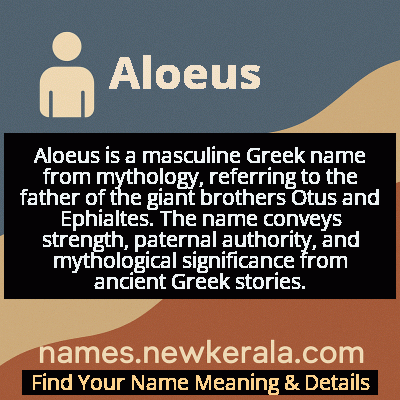Aloeus Name Meaning & Details
Origin, Popularity, Numerology Analysis & Name Meaning of Aloeus
Discover the origin, meaning, and cultural significance of the name ALOEUS. Delve into its historical roots and explore the lasting impact it has had on communities and traditions.
Name
Aloeus
Gender
Male
Origin
Greek
Lucky Number
1
Meaning of the Name - Aloeus
Aloeus is a masculine Greek name from mythology, referring to the father of the giant brothers Otus and Ephialtes. The name conveys strength, paternal authority, and mythological significance from ancient Greek stories.
Aloeus - Complete Numerology Analysis
Your Numerology Number
Based on Pythagorean Numerology System
Ruling Planet
Sun
Positive Nature
Leaders, ambitious, highly driven, self-reliant, innovative.
Negative Traits
Overly aggressive, domineering, impatient, selfish.
Lucky Colours
Red, orange, gold.
Lucky Days
Sunday.
Lucky Stones
Ruby, garnet.
Harmony Numbers
2, 3, 9.
Best Suited Professions
Entrepreneurs, managers, engineers.
What People Like About You
Courage, determination, leadership.
Famous People Named Aloeus
Aloeus of Greek Myth
Mythological Figure
Father of the Aloadae giants who attempted to storm Mount Olympus
Aloeus (Literary Reference)
Mythological Character
Featured in Homer's Odyssey as a significant figure in giant mythology
Aloeus (Hesiod's Theogony)
Mythological Patriarch
Appears in Hesiod's cosmology as part of the giant lineage challenging divine order
Name Variations & International Equivalents
Click on blue names to explore their detailed meanings. Gray names with will be available soon.
Cultural & Historical Significance
The story appears in multiple classical sources including Homer's Odyssey and Hesiod's works, establishing Aloeus as a symbol of primal, earth-born power and the dangerous potential of unchecked ambition. The myth also connects to broader Greek cosmological beliefs about the relationship between giants, gods, and the natural world. In later cultural interpretations, Aloeus represents the archetypal father figure whose legacy—both in terms of his sons' physical might and their fatal ambition—continues to influence how we understand the transmission of power and character across generations.
Extended Personality Analysis
Individuals named Aloeus are typically perceived as possessing strong, commanding personalities with natural leadership qualities. They often exhibit immense determination and ambition, coupled with a protective nature toward those they consider family or under their care. Their personality is frequently characterized by a larger-than-life presence, both in physical stature and in their aspirations and goals. However, this strength can sometimes manifest as stubbornness or an unwillingness to compromise when they believe strongly in their cause.
They tend to be traditional in their values yet innovative in their approaches to challenges, combining ancient wisdom with modern solutions. The mythological association suggests someone who is both a builder and a challenger—capable of great achievements but potentially prone to overreaching if not tempered by wisdom and perspective. Their leadership style often involves setting ambitious goals and inspiring others to achieve what might seem impossible, though they must guard against the temptation to reach beyond reasonable limits. The name carries an expectation of strength, reliability, and the capacity to leave a significant legacy.
Modern Usage & Popularity
In contemporary times, Aloeus remains an extremely rare given name, primarily used by classical scholars, mythology enthusiasts, or parents seeking unique names with historical depth. Its usage is more common in Greece and among diaspora communities with strong connections to classical heritage. The name has seen minimal popularity in naming charts and is considered a distinctive choice that conveys strength and mythological significance. Modern usage often appears in academic contexts, literary references, or as a character name in fantasy literature and media rather than as a common personal name. Its rarity makes it appealing to those seeking a name that stands out while carrying substantial historical and cultural weight, though its strong mythological associations may deter some parents concerned about the name being too imposing or unusual for everyday use.
Symbolic & Spiritual Meanings
Symbolically, Aloeus represents immense strength, paternal authority, and the boundary between mortal ambition and divine limitation. The name embodies the concept of challenging established orders and pushing beyond conventional limits. It symbolizes both the creative potential of human ambition and the dangers of overreaching—the fine line between heroic achievement and destructive hubris. As the father of giants, Aloeus also represents foundational strength, legacy, and the transmission of power across generations. The name carries connotations of earth-based power, primal energy, and the raw force of nature untamed by civilization or divine restraint. It serves as a reminder that great power requires equal wisdom to wield properly, and that the most impressive achievements often come with corresponding responsibilities and risks.

